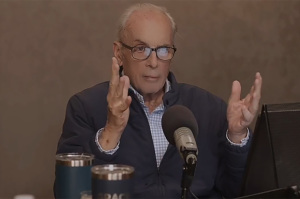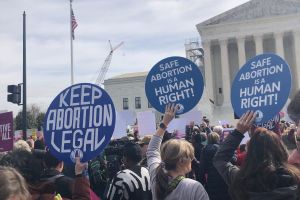Why Won't Abortion Go Away as an Issue?
January 22, 2012 marked the 39th anniversary of Roe v. Wade, the Supreme Court decision which gave us abortion on demand.
After all these years, and tens of millions of abortions in these United States-killing more than twice the population of Canada-why won't this issue go away?
Some people think the Supreme Court (in that 7 to 2 decision) nailed down the issue once and for all in 1973. End of story.
"But the Court's decision has by no means settled the debate," wrote President Ronald Reagan eleven years later in a book he wrote, entitled Abortion and the Conscience of the Nation. He continued, "Instead, Roe v. Wade has become a continuing prod to the conscience of the nation."
Even Roe (Norma McCorvey) doesn't agree with Roe any more-making it, if you will, Roe v. Roe. She even tried to get it overturned years later, after she became pro-life, but to no avail.
Our country is not an oligarchy (rule by the few). The founding fathers warned against that as tyranny.
Instead, we have a republic, where we elect representatives, who decide things for us (with our input). James Madison spells all this out in Federalist #10.
To use a baseball analogy, we also have a judicial branch, which is to act as an umpire in case there are close calls to monitor.
But what would happen in a baseball game, if the umpires decided to change the rules of the game, willy-nilly-in the middle of the game?
That is kind of what happens sometimes in our courts, including in the example of Roe v. Wade, where judges decide to legislate from the bench, usurping the role from Congress.
I once interviewed Robert Bork, eminent legal scholar, former Yale professor, and Supreme Court nominee, on the subject of judicial tyranny. He said this about Roe v. Wade:
There's not an ounce of legal reasoning in it. He [Justice Harry Blackmun, who wrote the majority opinion] goes through what the ancient Egyptians thought about abortion; he goes through the English Common Law of abortion; he goes through what the American Hospital Association thinks about abortion; what the American Medical Association thinks about it; and then, suddenly, after all this history, which is utterly irrelevant to the issue before him, he suddenly says, "Well, there is a right of privacy and it's broad enough to cover the right to abortion." Bang. It's a terrible opinion.
Even some liberals admit that Roe was not a good example of legal reasoning; but they like its effects, so they embrace it. Conservative commentator Gary Bauer cites an example in pro-abortion rights Supreme Court Justice Ruth Bader Ginsburg, who called Roe v. Wade "heavy-handed judicial intervention."
Abortion is a sacred right to the liberals, regardless of how it came to us.
When it comes to politics, I view abortion as such a critical issue, since I affirm what the Good Book says. As human beings, we are made in God's image; therefore, we have inherent value. But noooooooo. The Court says that value only applies when you're born, and that has not been overturned, lo these 39 years.
I feel that if a politician can't get this issue of abortion right, what else can't he or she get right? It's so basic. Sonograms improve over time and document the humanity of the unborn baby.
So why does abortion continue to remain so divisive to we the people of this republic? Because we the people never got to vote on it.
That vote was taken away, and it has never been restored. One of those Supreme Court justices dissenting in Roe, Byron White (appointed by John F. Kennedy), even called the decision "an act of raw judicial power."
In short, abortion on demand as a "constitutional right" was imposed on us by judicial fiat. This decision was handed down as if it were from Mt. Olympus, delivered by our robed masters. None of those particular judges in the 1973 case still sits on the Court. They've all since died (and stood before a different judgment seat, from which there is no appeal).
So as you consider casting your ballot for which candidates you support during this election year, on this anniversary of the lethal decision of Roe v. Wade, ask yourself what types of judges would your candidate nominate or support. Do they believe in judicial activism or judicial restraint?
In some cases, as in abortion, it is literally a matter of life and death.





























